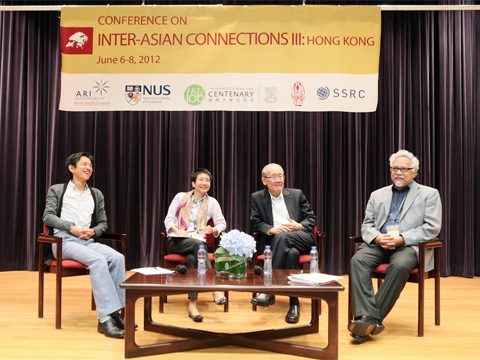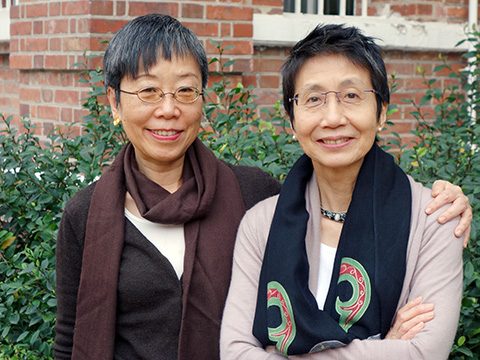- ABOUT IHSSABOUT IHSS
- PEOPLE
- NEWS & EVENTSNEWS & EVENTS
- RESEARCHRESEARCH
- FELLOWSHIPS & GRANTSFELLOWSHIPS & GRANTS
- TEACHING & LEARNINGTEACHING & LEARNING
- PUBLICATIONSPUBLICATIONS
In 2001, the Institute began with a focus on comparative regional studies of China, historical and contemporary. A number of multi-year research training clusters were commissioned in its first five years with a focus on historical preservation, lineage formations, religious and rituals of local communities, on the northwest and southwest regions. Some other research training clusters were later developed centering on coastal cities (especially on Yangzi and Pearl River deltas), inquiring contemporary social science issues such as urbanization, migrant health, and modern public sphere.

In 2001, the Institute began with a focus on comparative regional studies of China, both historical and contemporary. During its first five years, a number of multi-year research training clusters were commissioned with a focus on historical preservation, lineage formations, religious and rituals of local communities, in the northwest and southwest regions. Subsequently, other research training clusters were developed focusing on coastal cities, especially the Yangzi and Pearl River deltas, exploring contemporary social science issues such as urbanisation, migrant health, and the modern public sphere.
Since 2006, the Institute has broadened its agenda to explore China’s global engagements and a dynamic Asia. While deepening existing comparative regional studies of China, the Institute has also developed new strategic alliances in the United States, Europe, Singapore, India, and the Middle East. Key partners include Yale University, the Harvard-Yenching Institute, National Singapore University, and the Social Science Research Council. The Institute’s “Asian Connections” agenda included multi-year research clusters focusing on historical trading empires and contemporary finance flows, urban ecologies in Asia’s mega-cities, colonial medicine and global public health, indigenous charities across cultures, and Chinese-African diasporas.
In 2009, the Centre of Asian Studies (CAS), a long-standing research unit at The University of Hong Kong, became part of the Institute. The Institute was restructured and enhanced, incorporating some programmes of the former CAS, such as its research and teaching on family business and business history. Since then, the Institute has grown in size and research power, driven by five research clusters that bring together local and global scholars, as well as public and private resources:
With the award of the $74 million Areas of Excellence (AoE) grant “Quantitative History of China: Historical Roots of Recent Success and Future Development,” which commenced on January 1, 2023, Principal Coordinator (PC) and IHSS Director Zhiwu Chen leads this cluster with collaborators at the Institute, the HKU Business School, and several other universities in Hong Kong and beyond. As part of this cluster, the Institute has jointly established the Centre for Quantitative History (CQH) with the HKU Business School to provide a focused platform for research and dissemination efforts.
On the teaching front, the Institute launched a one-year taught Master of Family Wealth Management (‘FWM’) programme in the 2024/2025 academic year. This programme is built on the Institute’s longstanding research and teaching portfolio in areas such as the history of family business, family dynasties, and succession case studies, and leverages the current team’s expertise covering asset allocation and investment management.
With a growing group of scholars supported by a dedicated team of administrative members, the Institute looks forward to the next phase of development with enhanced synergy and collaboration across the clusters and among the activities/programmes.
In 2001, the Institute began with a focus on comparative regional studies of China, historical and contemporary. A number of multi-year research training clusters were commissioned in its first five years with a focus on historical preservation, lineage formations, religious and rituals of local communities, on the northwest and southwest regions. Some other research training clusters were later developed centering on coastal cities (especially on Yangzi and Pearl River deltas), inquiring contemporary social science issues such as urbanization, migrant health, and modern public sphere.

The Institute’s core programs, including lecture series, advanced training workshops, multi-year research clusters, commissioned projects, outreach programs and bilingual publications, are interlocked to produce multiplier effects on our targeted academic, business and policy communities. It gathered a critical mass of young scholars and advanced graduate students from Hong Kong, China and North America who subscribed to the Institute’s training workshops and seminar series. It has also leveraged key academic partners in China such as Sun Yat-sen University, Beijing Normal University, East China Normal University, Fudan University, Tsinghua University and the Chinese Academy of Social Sciences.

Since 2006, the Institute has broadened its agenda to explore China’s global engagements and a dynamic Asia. While deepening existing comparative regional studies of China, the Institute also developed new strategic alliances in the United States, Europe, Singapore, India, and the Middle East. Key partners include Yale University, the Harvard-Yenching Institute, National Singapore University, and the Social Science Research Council. The Institute’s “Asian Connections” agenda included multi-year research clusters centering on historical trading empires and contemporary finance flows, urban ecologies in Asia’s mega-cities, colonial medicine and global public health, indigenous charities across cultures, and Chinese-African diasporas. More research clusters are being generated.

Since 2006, the Institute has broadened its agenda to explore China’s global engagements and a dynamic Asia. While deepening existing comparative regional studies of China, the Institute also developed new strategic alliances in the United States, Europe, Singapore, India, and the Middle East. Key partners include Yale University, the Harvard-Yenching Institute, National Singapore University, and the Social Science Research Council. The Institute’s “Asian Connections” agenda included multi-year research clusters centering on historical trading empires and contemporary finance flows, urban ecologies in Asia’s mega-cities, colonial medicine and global public health, indigenous charities across cultures, and Chinese-African diasporas. More research clusters are being generated.
In 2009, the Centre of Asian Studies, a long-standing research unit at The University of Hong Kong, became part of the Institute. The unit was restructured and enhanced, with some programs of the former CAS incorporated.
A global search was launched in 2010 to look for a full-time director. On January 1, 2011, Professor Angela Ki Che Leung, a leading historian of the medical and social history of late Imperial and modern China, joined the Institute as its first full-time Director. While Professor Helen F. Siu has concluded her conscientious and voluntary service as the Honorary Director for the past ten years, she remains the chairperson of the Institute’s Executive Committee. She continues to work closely with Professor Leung to develop the Institute’s programs, and to line up new partners for the Institute in Asia, US, Europe and beyond.

A global search was launched in 2010 to look for a full-time director. On January 1, 2011, Professor Angela Ki Che Leung, a leading historian of the medical and social history of late Imperial and modern China, joined the Institute as its first full-time Director. While Professor Helen F. Siu has concluded her conscientious and voluntary service as the Honorary Director for the past ten years, she remains the chairperson of the Institute’s Executive Committee. She continues to work closely with Professor Leung to develop the Institute’s programs, and to line up new partners for the Institute in Asia, US, Europe and beyond.

Since then, the Institute has grown in size and research power driven by three research clusters that bring together local and global scholars, as well as public and private resources: Humanities in Science, Technology and Medicine; Hubs, Mobility and the Asian Urban; Rethinking Spirituality and Religion in Asia. With a growing group of scholars supported by an efficient administrative team, it looks forward to the next phase of development with new research strengths emerging out of the existing programs.
Copyright © 2025 Hong Kong Institute for the Humanities and Social Sciences, The University of Hong Kong. All Rights Reserved.